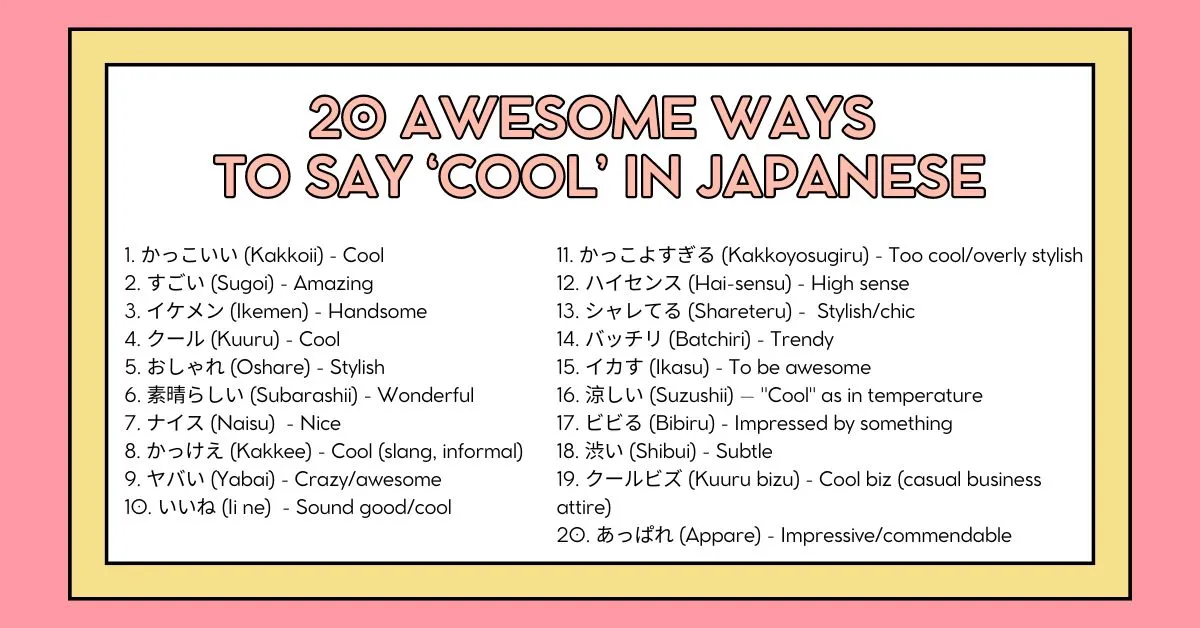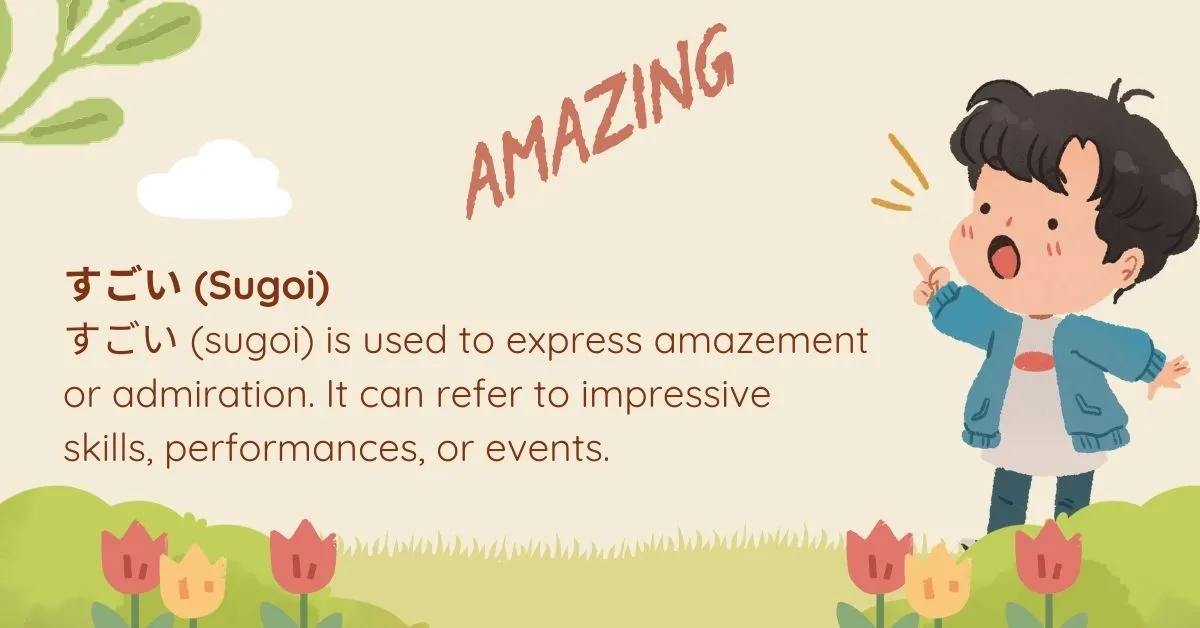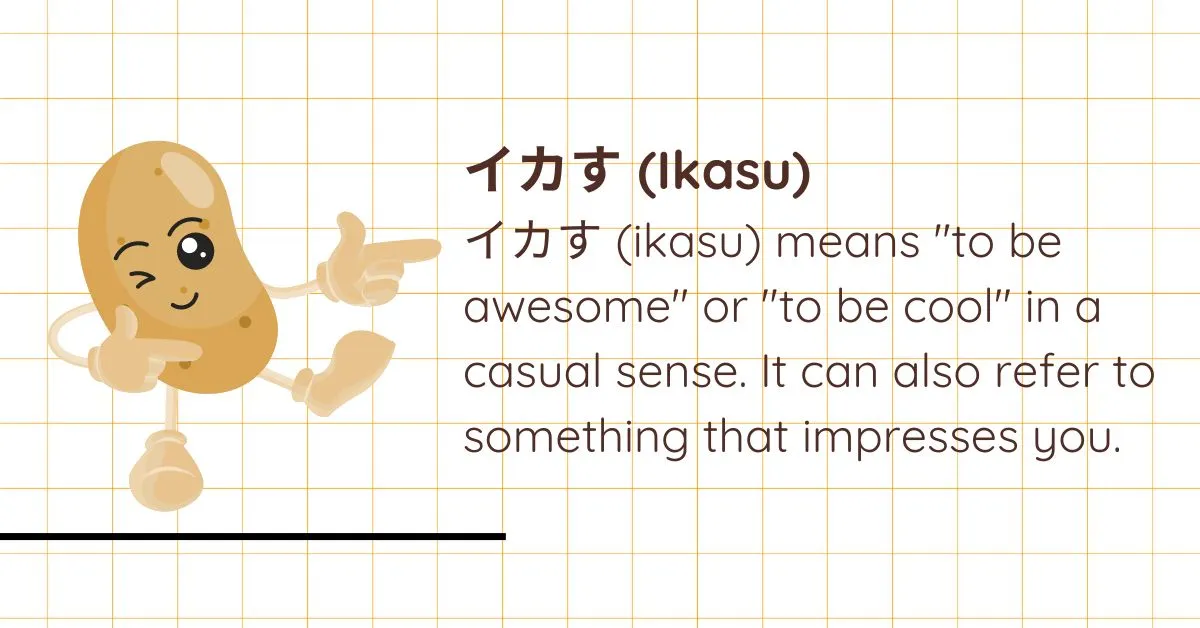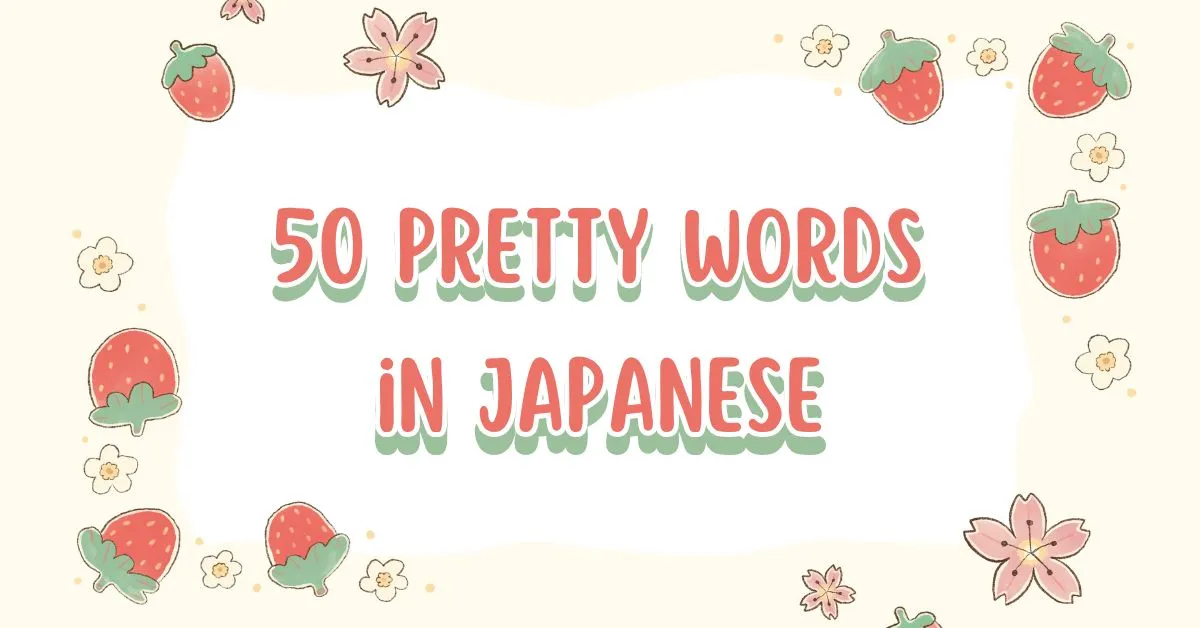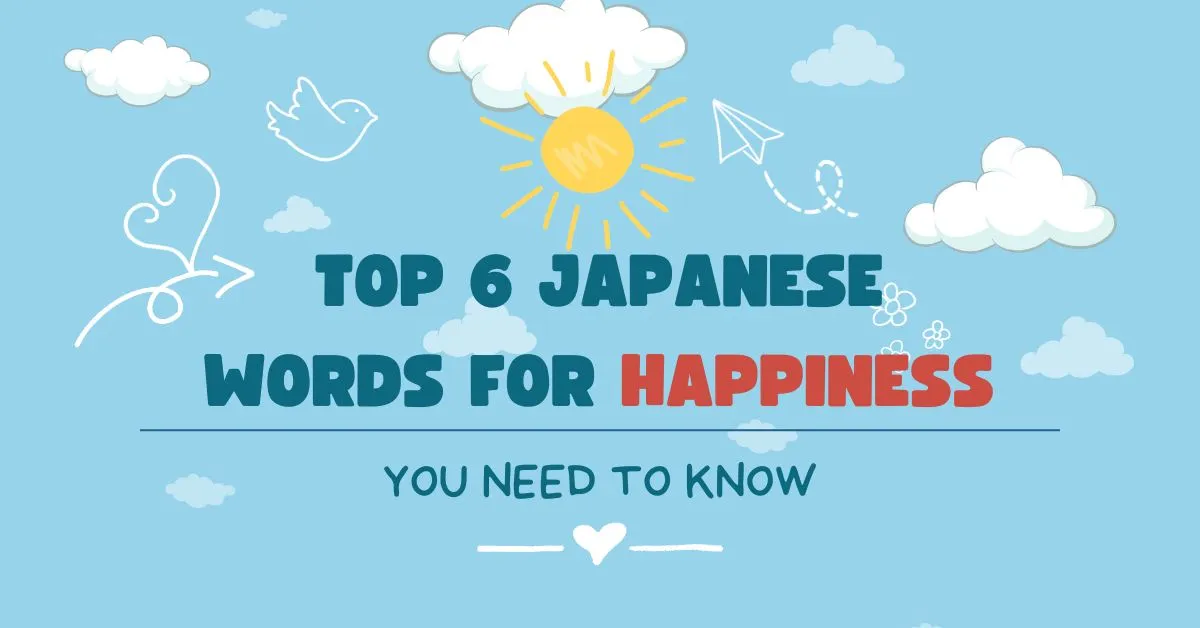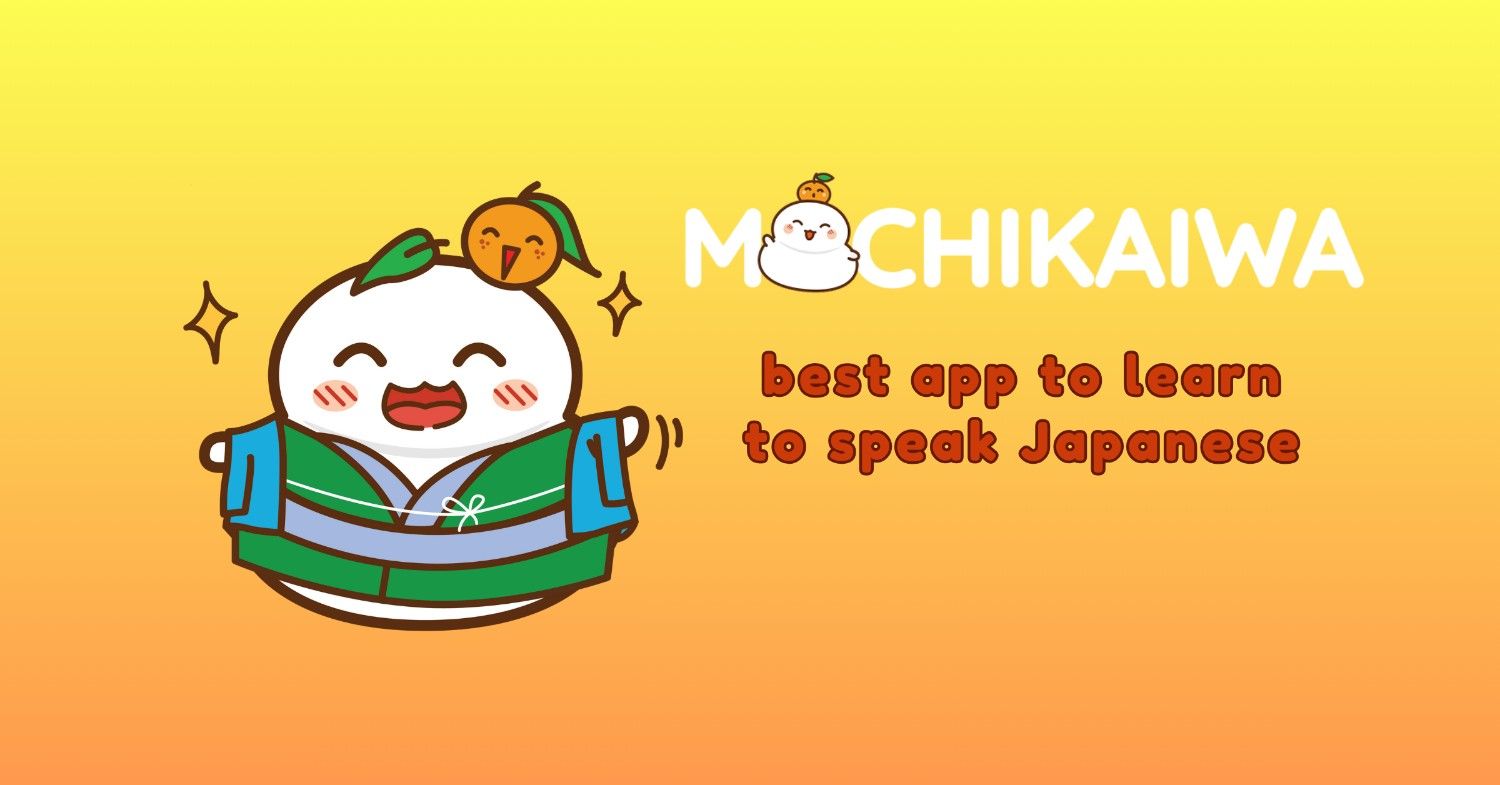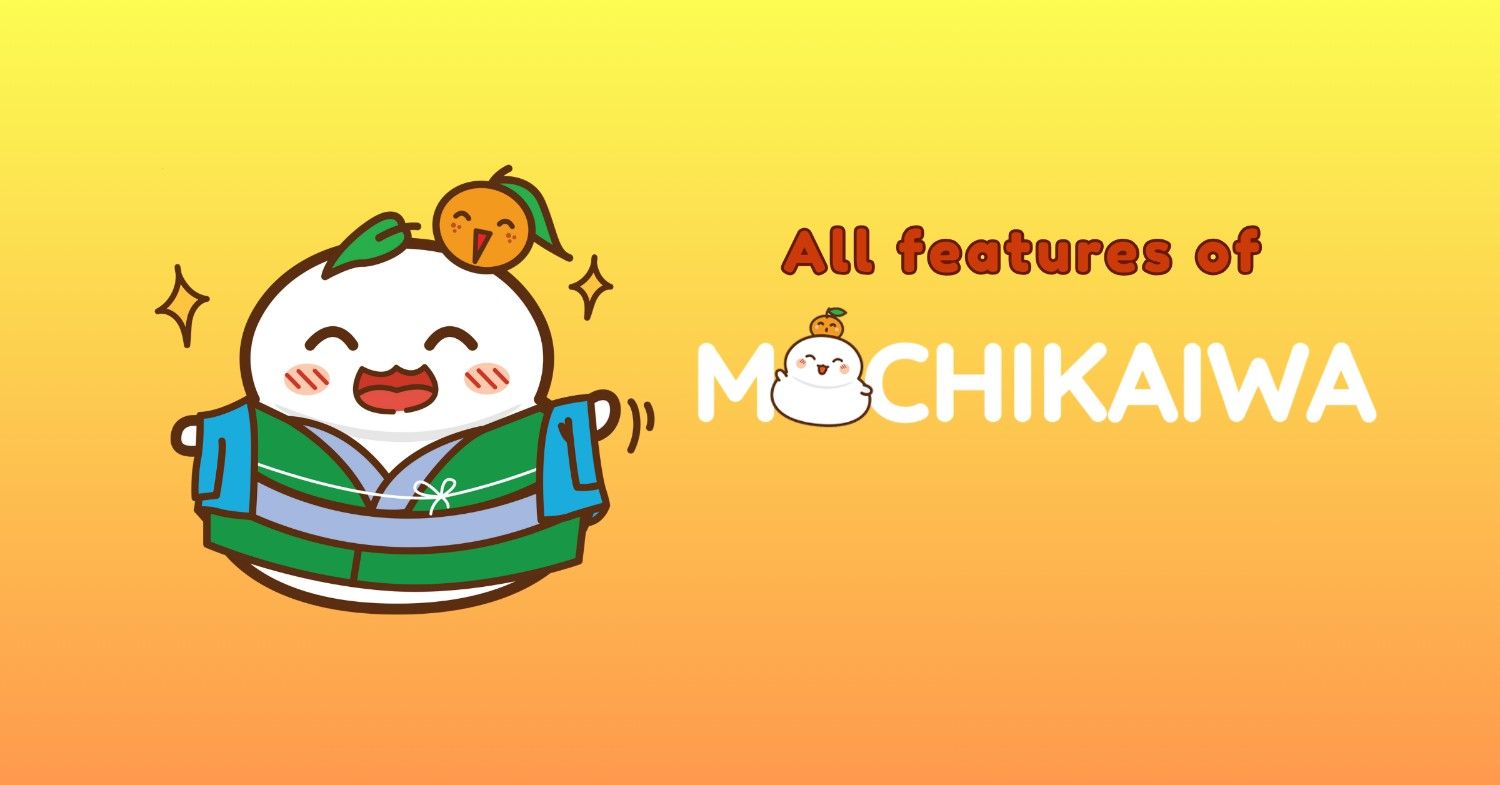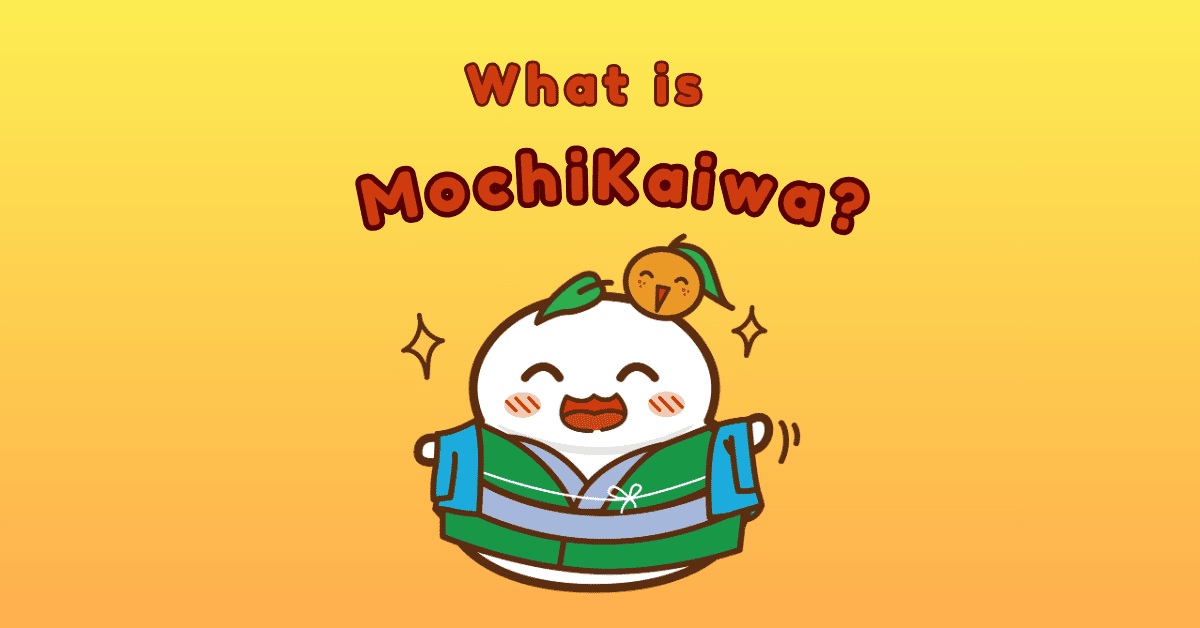Japanese is full of colorful expressions, and when it comes to saying “cool,” the language offers plenty of fun and dynamic ways to express this. Whether you’re talking about a person, a situation, or something impressive, learning how to say “cool” in Japanese will help you fit right into casual conversations. In this guide, we’ll explore 20 common ways to say “cool” in Japanese, from casual slang to more refined terms.

20 ways to say ‘cool’ in Japanese
1. かっこいい (Kakkoii) – The most common way to say ‘cool’
The word かっこいい (kakkoii) is by far the most popular way to say “cool” in Japanese. It’s versatile and can be used to describe anything from people to objects. If someone is dressed well or looks stylish, you can say, “彼はかっこいいです (Kare wa kakkoii desu),” meaning “He is cool” or “He looks great.”
The word can also describe impressive things, like a car, a movie, or even a situation. For example, “その車はかっこいいです (Sono kuruma wa kakkoii desu)” translates to “That car is cool.”
2. すごい (Sugoi)
すごい (sugoi) is used to express amazement or admiration. It can refer to impressive skills, performances, or events. For instance, “その映画はすごいです (Sono eiga wa sugoi desu)” means “That movie is awesome.”
3. イケメン (Ikemen)
イケメン (ikemen) specifically refers to a good-looking man. It’s a casual way to compliment someone’s looks, particularly young men. You might say, “彼はイケメンだ (Kare wa ikemen da),” meaning “He is a handsome guy.”
4. クール (Kuuru)
Much like in English, Japanese also borrows the word クール (kuuru) directly from English. This word is often used in a more literal sense, meaning something that’s not just “cool” in style but also “cool” in temperature.
However, in casual speech, people also use kuuru to express admiration, similar to how we say “cool” in English. For example, you might say “彼女はクールだ (Kanojo wa kuuru da),” meaning “She’s cool.”
5. おしゃれ (Oshare)
おしゃれ (oshare) describes someone who has a good sense of style or is fashionable. You might say, “彼女はいつもおしゃれだ (Kanojo wa itsumo oshare da),” meaning “She is always stylish.”
6. 素晴らしい (Subarashii)
素晴らしい (subarashii) is a more formal way to express that something is wonderful or fantastic. For example, “このパフォーマンスは素晴らしいです (Kono pafōmansu wa subarashii desu)” translates to “This performance is fantastic.”
7. ナイス (Naisu)
ナイス (naisu) is a loanword from English that is used in casual conversations to mean “nice” or “cool.” For instance, “ナイスな選択 (Naisu na sentaku)” means “Nice choice.”
8. かっけえ (Kakkee)
かっけえ (kakkee) is a slang variation of かっこいい (kakkoii) and is often used among younger people. It conveys a casual, laid-back sense of “cool.”
Enhance your Japanese vocabulary with MochiKanji by mastering words like ‘cool’ and exploring other themed terms.
Start learning today and see how fun and effective language study can be!
9. ヤバい (Yabai)
ヤバい (yabai) originally meant “dangerous,” but in casual usage, it can also mean “awesome” or “cool.” For example, “このバンドはヤバい (Kono bando wa yabai)” means “This band is awesome.”
10. いいね (Ii ne)
いいね (ii ne) is a casual expression used to show approval or agreement, similar to saying “sounds good” or “cool.” For example, “そのアイデアはいいね (Sono aidea wa ii ne)” means “That idea is cool.”
11. かっこよすぎる (Kakkoyosugiru)
かっこよすぎる (kakkoyosugiru) means “too cool” or “overly stylish.” It can be used to express admiration for something exceptionally impressive.
12. ハイセンス (Hai-sensu)
ハイセンス (hai-sensu) refers to someone with great taste or a refined sense of style. You might say, “彼はハイセンスなファッションを持っている (Kare wa hai-sensu na fasshon o motte iru),” meaning “He has a high sense of fashion.”
13. しゃれてる (Shareteru)
しゃれてる (shareteru) indicates that something or someone is stylish or chic, often with a sense of flair. For example, “彼女の服はシャレてる (Kanojo no fuku wa shareteru)” means “Her clothes are chic.”
14. イケてる (Iketeru) – Cool and Trendy
イケてる (iketeru) is a slang word often used by younger generations to describe something that’s trendy, stylish, or fashionable. It’s similar to saying “hip” or “in” in English. You might use it when talking about the latest fashion or a popular celebrity. For example, “このシャツはイケてる (Kono shatsu wa iketeru)” means “This shirt is cool.”
15. イカす (Ikasu)
イカす (ikasu) means “to be awesome” or “to be cool” in a casual sense. It can also refer to something that impresses you.
16. 涼しい (Suzushii) – “Cool” as in temperature
If you’re talking about the weather or temperature, the word 涼しい (suzushii) is your go-to term. It means “cool” in a refreshing sense, like a cool breeze on a summer day. You might say, “今日は涼しいですね (Kyou wa suzushii desu ne),” meaning “It’s cool today, isn’t it?”
This is not a slang term but rather a more formal way to describe physical coolness, perfect for talking about the weather or climate.
17. ビビる (Bibiru)
ビビる (bibiru) is a casual expression that means to be surprised or impressed by something. For example, “あの演技にはビビった (Ano engi ni wa bibitta)” means “I was impressed by that performance.”
18. 渋い (Shibui)
渋い (shibui) refers to a sophisticated or understated kind of coolness. It can describe art, fashion, or even a person’s demeanor. For instance, “その色合いは渋いですね (Sono iriai wa shibui desu ne)” means “That color is cool in a subtle way.”
19. クールビズ (Kuuru bizu)
クールビズ (kuuru bizu) refers to a relaxed dress code in the workplace, especially during hot summer months in Japan, where employees can wear lighter clothing. It’s a way to express being stylish yet comfortable.
20. あっぱれ (Appare)
あっぱれ (appare) is an expression of admiration or praise, often used to commend someone’s achievements or actions. It translates to “Bravo!” or “Well done!”
Conclusion
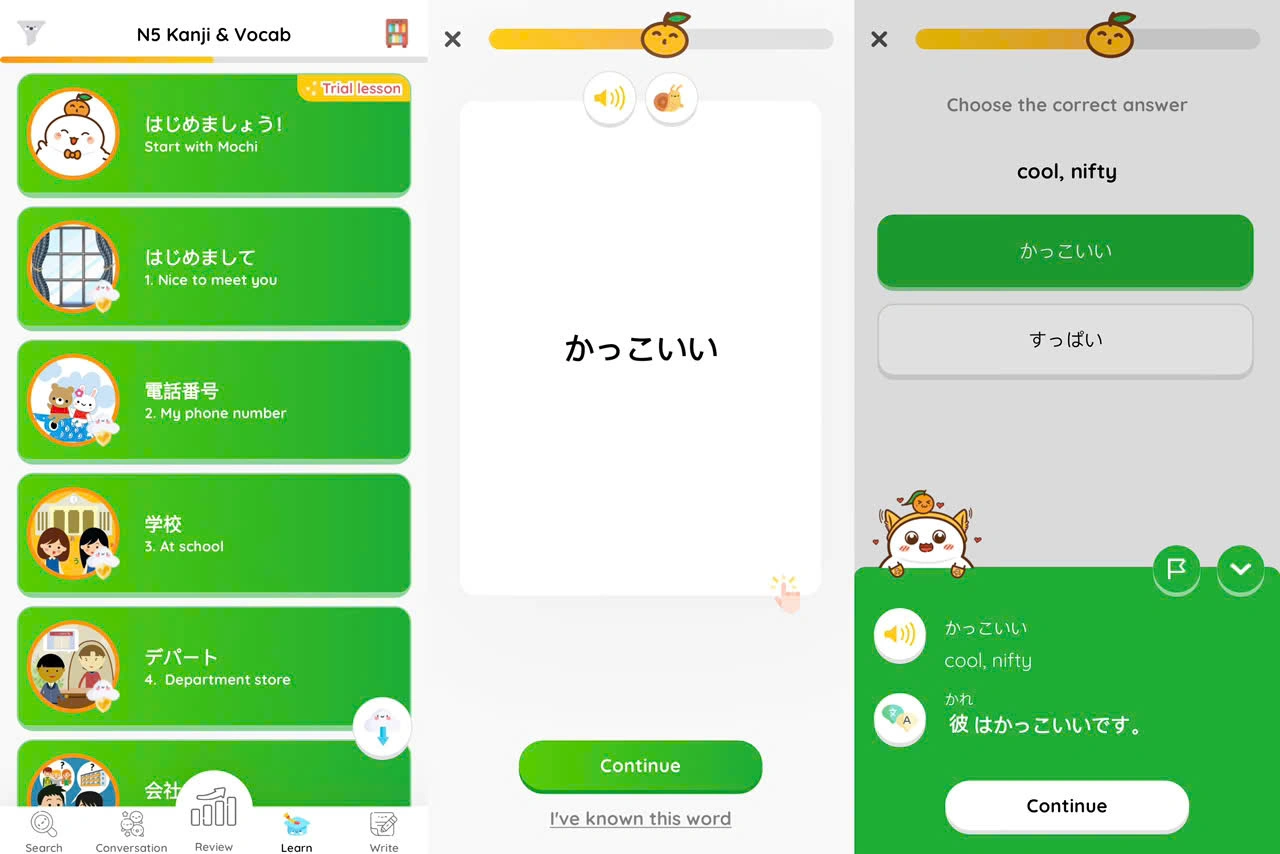
To learn how to say “cool” in Japanese and master kanji effectively, using the MochiKanji app can be incredibly beneficial. This tool utilizes spaced repetition, ensuring you review kanji at optimal times for better retention. With features like kanji writing practice and flashcards, MochiKanji makes it easier to remember characters and their meanings.
There are plenty of ways to say “cool” in Japanese, each carrying a unique flavor that reflects the diverse expressions found in the language. From casual slang to formal compliments, these 20 expressions will help you sound more natural in conversation. So, next time you want to describe something cool, you’ll have the perfect Japanese word ready to impress!

